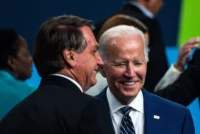
How U.S. Pressure Helped Save Brazil’s Democracy
Two weeks ago, Brazil’s federal police launched a high-profile raid against former President Jair Bolsonaro and more than 10 of his allies, including Brazil’s former navy chief, national security advisor, and ministers of defense and justice. Authorities accused the group of plotting a potential coup after Bolsonaro’s failed 2022 reelection bid.
Court documents related to the raid suggest that Bolsonaro personally edited a decree that would have overturned election results and imprisoned a Supreme Court justice; a general loyal to the president confirmed he would provide the troops needed to carry out the coup. Bolsonaro also allegedly pressured his cabinet to more forcefully share disinformation about supposed weaknesses in Brazil’s electoral system.… Seguir leyendo »


